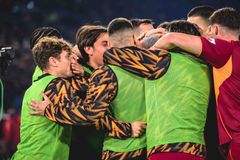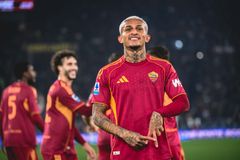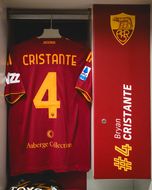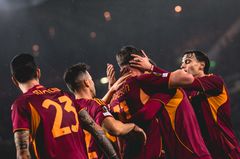

Having succeeded Gaetano Anzalone, the elegant Viola – born in Aulla – brought a new managerial style to the club, which he took to new levels of excellence.
“Running a football club is much more difficult than running a company, but I’ve adopted the same method,” he once said.
Under his stewardship, the Giallorossi won one Scudetto and four Coppa Italia titles – five if you count the 1990-91 Coppa Italia. Viola’s successor, Giuseppe Ciarrapico, replaced him in the spring of 1991, but the team was already well on the way to reaching the UEFA Cup and Coppa Italia finals.
As Roma prepare to take their first strides in the 2020-21 edition of the Coppa Italia, let’s take a look at how the competition became inextricably linked with the Dino Viola presidency, starting in May 1980.
COPPA ITALIA 1979-80
The Giallorossi – who wore white Pouchain jerseys with yellow, orange and red detailing that season – were drawn against Perugia, Ascoli, Sampdoria and Bari in the initial group stage of this edition.
Roma beat Perugia 1-0 away in the first game courtesy of a goal from Agostino Di Bartolomei – and it was also the first competitive victory of the Viola presidency. The Giallorossi would finish the group top on seven points, going on to beat AC Milan in the quarter-finals, Ternana in the semi-finals and Torino in the final itself.
Goalkeeper Franco Tancredi played a key role in the final, which took place at the Stadio Olimpico, saving four spot-kicks in the all-important penalty shoot-out when a Torino win seemed the most likely outcome.
There were wonderful scenes of celebration afterwards, with torches lighting up the evening sky. The victory meant that Roma – coached by Nils Liedholm – returned to Europe (in the form of the Cup Winners’ Cup) for the first time in five years, as well as securing the third Coppa Italia title in the club’s history.
COPPA ITALIA 1980-81
Roma entered this edition at the quarter-final stage with a two-legged tie against Fiorentina. The Giallorossi won the first leg courtesy of a goal from Alberto Di Chiara, who would go on to become an iconic player for Fiorentina. And that goal proved all the more decisive when the second leg finished 0-0, meaning Roma advanced to the semi-finals.
Juventus were the opposition, but they met more or less the same fate as Fiorentina, as Roma won 1-0 at home and drew 1-1 away. Torino were again the opposition in the final, which was this time played over two legs.
Both games finished 1-1 – penalties would be required once more. Tancredi again rose to the occasion, giving Paulo Roberto Falcao the chance to score the winning spot-kick. The Brazilian had joined Roma in August 1980 and would play a big role – alongside Viola – in a golden era for the club.
Falcao duly converted from the spot to secure the club’s fourth Coppa Italia crown.
COPPA ITALIA 1983-84
Since Roma’s last Coppa Italia triumph, Liedholm’s side had already won the Giallorossi’s second Scudetto title (in May 1983) and steered the team to the European Cup final.
Roma may have fallen at the final hurdle on that count on 30 May 1984, finding themselves on the losing side of a penalty shoot-out this time, but they found some consolation around a month later when they beat Verona in a two-legged Coppa Italia final.
The Giallorossi had already faced and beaten Rimini, Arezzo, Atalanta, Padova, Reggiana, AC Milan and Torino over the course of the group stage, last-16, quarter-finals and semi-finals. Roma drew 1-1 with Verona away before beating them 1-0 at home to clinch the trophy, which Agostino Di Bartolomei lifted into the sky on his final appearance as Roma captain before moving to AC Milan.
COPPA ITALIA 1985-86
This time, Coppa Italia glory had to provide consolation for disappointment in the league, where Roma had let the title get away from them on the penultimate day of the season against a Lecce side that had already had relegation confirmed.
This stumble from Sven-Goran Eriksson’s men allowed Juventus to sneak in and clinch the Serie A title, but Roma did at least have the cup to play for. The Giallorossi made no mistake, beating Sampdoria in the final thanks to a young team packed full of academy talent, such as Stefano Impallomeni, Antonio Di Carlo, Sandro Tovalieri and Stefano Desideri.
The final was again contested over two legs. Sampdoria ran out 2-1 winners in the first leg, played in Genoa, but Roma’s 2-0 win back at the Olimpico meant the Giallorossi again won the cup, with Toninho Cerezo scoring the all-important goal.
“In the last minute, in his last minute,” cried Alberto Mandolesi over the radio.
Sure enough, the very next day Cerezo left Roma after three years in the capital. His new team? Sampdoria.
COPPA ITALIA 1990-91
The final season of the Viola presidency was marred by the death of the president himself on 19 January 1991. As if to honour the memory of their beloved president, Ottavio Bianchi’s Roma side surged to two finals: the UEFA Cup and the Coppa Italia.
There was disappointment in Europe, however, as Roma’s 1-0 win at the Olimpico was not enough to turn around a 2-0 first-leg deficit against Inter Milan.
Things were different on the domestic front, though, as Giuseppe Giannini captained the Giallorossi to their seventh Coppa Italia triumph. Sampdoria were once again the opposition in the final, with Roma running out 3-1 winners at the Olimpico before securing the trophy at Marassi after a 1-1 draw.
It was quite the achievement from the Giallorossi, who had beaten Juventus and AC Milan on their way to the final, where Vujadin Boskov’s newly crowned Italian champions waited with the likes of Gianluca Vialli and Roberto Mancini in their ranks.
Roma may have already had a new president – Giuseppe Ciarrapico – by the time the final was played, but it was fitting that Flora Viola, the wife of the late Dino, was there in Genoa to lift the trophy too.

 Tickets
Tickets
 Shop
Shop







































